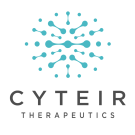Cyteir Therapeutics Secures Additional $40.2 Million In Its Series B Financing And Doses First Patient In Phase 1/2 Study Of First-In-Class RAD51 Inhibitor
- New funding brings total Series B raise to $75.2 million
- Novo Holdings led round, joined by Venrock, DROIA, Osage University Partners, Lightstone and Celgene Corporation
- RAD51 inhibitor CYT-0851 now being evaluated in patients with relapsed, refractory B-cell malignancies and advanced solid tumors
 Lexington, MA (Press Release) – Cyteir Therapeutics, a leader in the discovery and development of next-generation synthetic lethal therapies for cancer, today announced the close of an additional $40.2 million in the company's Series B financing, for a total of $75.2 million in this financing. The additional funding will be used to expand the clinical investigation of Cyteir's first-in-class RAD51 inhibitor and lead compound, CYT-0851, and to identify new targets using the company's novel gain-of-function synthetic lethality screening platform.
Lexington, MA (Press Release) – Cyteir Therapeutics, a leader in the discovery and development of next-generation synthetic lethal therapies for cancer, today announced the close of an additional $40.2 million in the company's Series B financing, for a total of $75.2 million in this financing. The additional funding will be used to expand the clinical investigation of Cyteir's first-in-class RAD51 inhibitor and lead compound, CYT-0851, and to identify new targets using the company's novel gain-of-function synthetic lethality screening platform.
Novo Holdings led the round, joined by existing investors Venrock, DROIA Oncology Ventures, Osage University Partners (OUP), Lightstone Ventures and Celgene Corporation. As part of this closing, Karen Hong, Ph.D., of Novo Ventures, which provides consulting services to Novo Holdings, will join the Cyteir Board.
"The continued support for Cyteir from highly knowledgeable investors reflects the growing excitement around our novel application of synthetic lethality," said Markus Renschler, M.D., Cyteir president and CEO. "This financing will support the recently launched first-in-human phase 1/2 study of CYT-0851 while simultaneously allowing us to continue investigating our synthetic lethality platform to find new targets that inhibit DNA damage repair. We believe this approach could lead to valuable new treatment options for cancer patients."
Cyteir's platform is based on the discovery of a relationship between DNA-damaging enzymes known as cytidine deaminases, and RAD51, a protein that is essential for the repair of DNA breaks. These enzymes are non-damaging in healthy tissues, but gain hyperactive function in a wide range of cancers and cause elevated DNA damage. Cyteir is developing selective small-molecule inhibitors of RAD51 to reduce the ability of cancer cells to self-repair through homologous recombination. This causes the cancer cells to become overwhelmed by accumulated DNA damage and undergo cell death – resulting in the therapeutic effect known as "synthetic lethality."
In preclinical experiments, CYT-0851 demonstrated synergy with PARP inhibitors, consistent with its DNA damage-repair pathway inhibitory activity. These results suggest CYT-0851 has the potential to overcome PARP inhibitor resistance.
Researchers at Sarah Cannon Research Institute in Nashville, Tenn., recently dosed the first patient in a Phase 1/2 study of CYT-0851. This study will enroll up to 200 patients with B-cell malignancies and solid tumors.
"We are pleased to be part of this study, which will help define the potential of an entirely new class of targeted cancer therapy," said Johanna Bendell, M.D., chief development officer at Sarah Cannon Research Institute and the study's lead investigator. "Pre-clinical evaluations of CYT-0851 have been very encouraging, and we look forward to seeing how this compound impacts patients in this trial."
In March 2019, Cyteir presented pre-clinical data at the 2019 American Association for Cancer Research annual meeting that validated the mechanism of action underlying the company's synthetic lethal platform and confirmed that CYT-0851 is a potent inhibitor of RAD51-mediated homologous recombination with the potential to target multiple cancers that have high levels of cytidine deaminase-related DNA damage. The data indicated that CYT-0851 could potentially be clinically active as a monotherapy against B-cell lymphomas and multiple solid tumors, including pancreatic cancer.
About the CYT-0851 Phase 1/2 Trial
CYT-0851-01 is a phase 1/2 study of CYT-0851 in patients with relapsed, refractory non-Hodgkin lymphoma, chronic lymphocytic leukemia, multiple myeloma, or advanced breast cancer, ovarian cancer, head and neck cancer, soft tissue sarcoma, and pancreatic cancer. The study will be conducted at leading research institutions in the United States. An initial dose-escalation phase will establish the safety and tolerability of CYT-0851 and identify the recommended phase 2 dose. This will be followed by an expansion phase to evaluate response rates among each of six disease cohorts. Cyteir is also developing a companion diagnostic assay to identify patients with tumors that overexpress certain cytidine deaminases that may make them more susceptible to RAD51 inhibition.
About CYT-0851
CYT-0851 is an experimental, oral, selective inhibitor of RAD51, a protein involved in homologous recombination. Cancer cells that overexpress certain DNA-damaging cytidine deaminases rely on RAD51 to repair DNA damage. In preclinical models, inhibition of RAD51 with CYT-0851 induces cell death in cytidine deaminase overexpressing cell lines and reduces proliferation.
About Cyteir Therapeutics
Cyteir, a private company based in Lexington, Mass., is an innovator in DNA repair, developing the next generation of synthetic lethal therapies designed to treat cancer. Cyteir exploits the synthetic lethality of gain-of-function DNA-damaging genes and DNA repair inhibition, resulting in selective death among cells with high levels of DNA damage. The company is backed by leading healthcare investors, including Novo Holdings, Venrock, DROIA, Osage University Partners (OUP) and Lightstone Ventures, as well as Celgene Corporation. For more information, visit www.cyteir.com.
Source: Cyteir Therapeutics.
Related Press Releases:
- None Found

